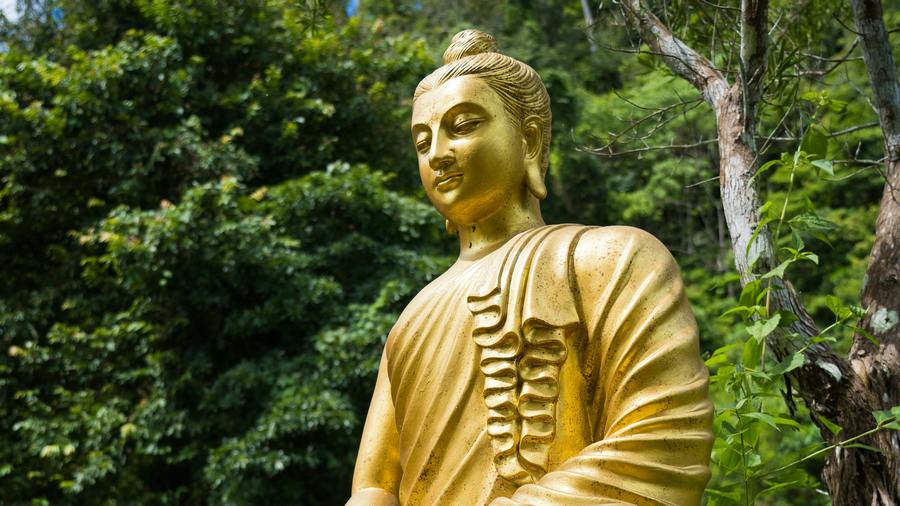[NOTE: This is one of the longest suttas in the Majjhima Nikāya. This selection is just the very end. If you are interested in learning more about the Buddha, it’s great to read the entire sutta.]
…“Sāriputta, there are certain recluses and brahmins whose doctrine and view is this: ‘As long as this good man is still young, a black-haired young man endowed with the blessing of youth, in the prime of life, so long is he perfect in his lucid wisdom. But when this good man is old, aged, burdened with years, advanced in life, and come to the last stage, being eighty, ninety, or a hundred years old, then the lucidity of his wisdom is lost.’ But it should not be regarded so. I am now old, aged, burdened with years, advanced in life, and come to the last stage: my years have turned eighty. Now suppose that I had four disciples with a hundred years’ lifespan, perfect in mindfulness, retentiveness, memory, and lucidity of wisdom. Just as a skilled archer, trained, practised, and tested, could easily shoot a light arrow across the shadow of a palm tree, suppose that they were even to that extent perfect in mindfulness, retentiveness, memory, and lucidity of wisdom. Suppose that they continuously asked me about the four foundations of mindfulness and that I answered them when asked and that they remembered each answer of mine and never asked a subsidiary question or paused except to eat, drink, consume food, taste, urinate, defecate, and rest in order to remove sleepiness and tiredness. Still the Tathāgata’s exposition of the Dhamma, his explanations of factors of the Dhamma, and his replies to questions would not yet come to an end, but meanwhile those four disciples of mine with their hundred years’ lifespan would have died at the end of those hundred years. Sāriputta, even if you have to carry me about on a bed, still there will be no change in the lucidity of the Tathāgata’s wisdom.
“Rightly speaking, were it to be said of anyone: ‘A being not subject to delusion has appeared in the world for the welfare and happiness of many, out of compassion for the world, for the good, welfare, and happiness of gods and humans,’ it is of me indeed that rightly speaking this should be said.”
Now on that occasion the venerable Nāgasamāla was standing behind the Blessed One fanning him. Then he said to the Blessed One: “It is wonderful, venerable sir, it is marvellous! As I listened to this discourse on the Dhamma, the hairs of my body stood up. Venerable sir, what is the name of this discourse on the Dhamma?”
“As to that, Nāgasamāla, you may remember this discourse on the Dhamma as ‘The Hair-Raising Discourse.’”
That is what the Blessed One said. The venerable Nāgasamāla was satisfied and delighted in the Blessed One’s words.
Read the entire translation of Majjhima Nikāya 12 Mahāsīhanādasutta: The Greater Discourse on the Lion’s Roar by Bhikkhu Bodhi on SuttaCentral.net. Or read a different translation on SuttaCentral.net or DhammaTalks.org. Or listen on PaliAudio.com or SC-Voice.net. Or explore the Pali on DigitalPaliReader.online.
Or read a translation in Deutsch, Русский, Srpski, বাংলা, Čeština, Español, Français, हिन्दी, Bahasa Indonesia, Italiano, 日本語, မြန်မာဘာသာ, Norsk, Português, සිංහල, Slovenščina, ไทย, Tiếng Việt, or 汉语. Learn how to find your language.


 All translations on this site by Bhikkhu Bodhi are licensed under a Creative Commons Attribution-NonCommercial-NoDerivs 3.0 Unported License.
Bhikkhu Bodhi, The Middle Length Discourses of the Buddha (Wisdom Publications, 2009), The Connected Discourses of the Buddha (Wisdom Publications, 2000), The Numerical Discourses of the Buddha (Wisdom Publications, 2012).
All translations on this site by Bhikkhu Bodhi are licensed under a Creative Commons Attribution-NonCommercial-NoDerivs 3.0 Unported License.
Bhikkhu Bodhi, The Middle Length Discourses of the Buddha (Wisdom Publications, 2009), The Connected Discourses of the Buddha (Wisdom Publications, 2000), The Numerical Discourses of the Buddha (Wisdom Publications, 2012).